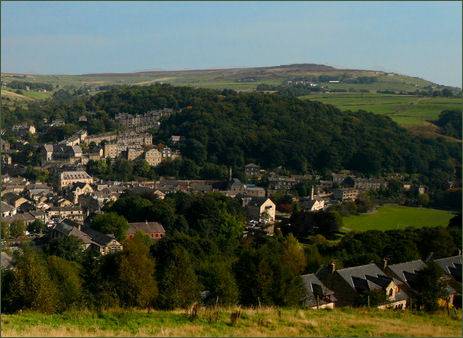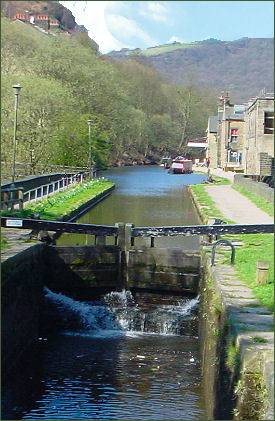Hebden Bridge
OS grid reference:- SD 993 273
 The market town of Hebden Bridge is situated on the steep slopes of the Upper Calder Valley, 8 miles (13 km) to the west of Halifax.
The market town of Hebden Bridge is situated on the steep slopes of the Upper Calder Valley, 8 miles (13 km) to the west of Halifax.
 The original settlement was the village of Heptonstall, which stands high on the hill above the town. Hebden is a corruption of the Anglo-Saxon 'Heopa Denu', meaning Bramble or Wild Rose Valley. Hebden Bridge, once referred to as Heptenbryge, developed in the late medieval era, where the Halifax to Burnley packhorse route descended into the valley and crossed the River Hebden where the old bridge, from which the name derives, stands.
The original settlement was the village of Heptonstall, which stands high on the hill above the town. Hebden is a corruption of the Anglo-Saxon 'Heopa Denu', meaning Bramble or Wild Rose Valley. Hebden Bridge, once referred to as Heptenbryge, developed in the late medieval era, where the Halifax to Burnley packhorse route descended into the valley and crossed the River Hebden where the old bridge, from which the name derives, stands.
With the arrival of mechanisation and steam power in the late eighteenth century Hebden Bridge began to grow into a bustling mill town. The arrival of the canal and railway attracted industry to the valley, but with the limited flat land available houses were accordingly constructed on the valley sides, giving the town its characteristic "double-decker" housing.
Gibson Mill, a renovated nineteenth century cotton mill houses a visitor centre with exhibitions covering the industrial and social history of the mill and its former workers. The town centre houses a number of organic, vegetarian and fair trade cafes and restuarants. The town also has a reputation for "great little shops" and offers a unique shopping experience. Built in 1777 by John Fawcett, Ebenezer Chapel, on Market Street now houses Heart Gallery. Hebden Bridge Town Hall and adjoining fire station is a Grade II listed building, dating to 1897. Hedben Bridge also has a small theatre and a cinema where a variety of community events are held throughout the year.
The White Lion Hotel is the oldest hotel in Hebden Bridge and dates back to 1657. The Hungarian composer Franz Liszt stayed there in 1840. The Old Packhorse Bridge, a scheduled ancient monument. dates to 1510. An earlier wooden bridge once occupied the site. Hebden Bridge Station was built by Lancashire and Yorkshire Railway in 1893 including engineering by George Stephenson.
The Little Valley Brewery sits high on the Pennine moorland of Cragg Vale and provides views over the Calder Valley and the town, it brews an inspiring range of beers, naturally refreshing and full of good taste and made from organic ingredients and soft water which is sourced from the Pennines.
The town lies close to the Pennine Way Long Distance Trail which runs from Edale, in Derbyshire to Kirk Yetholm, on the Borders and offers 268 miles of the finest upland walking in England.
Nearby Hardcastle Crags, is a beautiful wooded valley in the South Pennines which covers more than 160 hectares (400 acres) and lies approximately 2 miles (3.2 km) to the north of the town. There are deep ravines, tumbling streams, glorious waterfalls traversed by more than 15 miles (24km) of footpaths. The woodlands are particularly lovely in late Spring when the bluebells are in bloom. Halfway up the valley are the 'Crags' which are impressive stacks of millstone grit.
Hebden Bridge is popular for outdoor pursuits such as walking, climbing and cycling. It also lies on the Rochdale Canal, a through route across the Pennines, narrow boat cruises are available on the canal. Based at the Stubbing Wharf, Hebden Bridge Cruises offers scheduled cruises including Sunday Roast Cruises and Afternoon Tea Cruises.
The ancient and characterful West Riding village of Heptonstall, said to be one of West Yorkshire's best kept secrets, is situated on a steep hill to the north west of the town and lies on the route of the Calderdale Way, a 50 miles circular walk around the hills and valleys of Calderdale. The village supported the Parliamentarian cause during the Civil War and was the site of a battle in 1643.
Towns and Villages of Yorkshire
